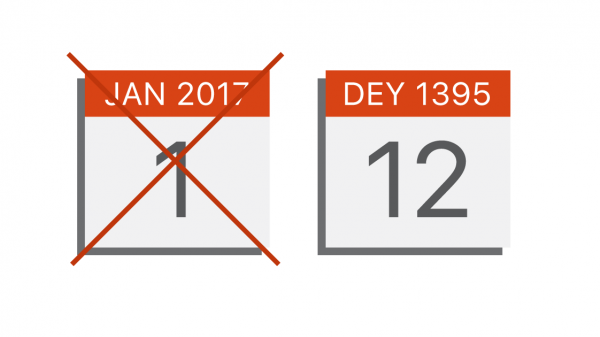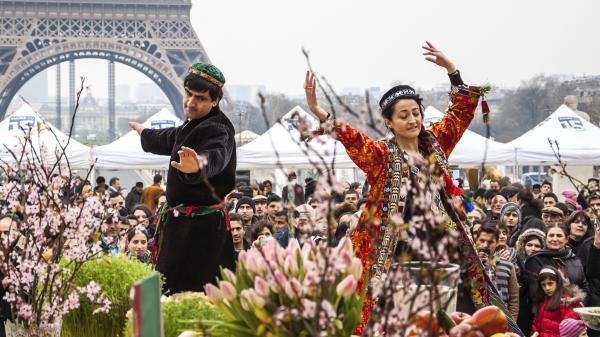Iranian Calendar to Become Global Standard in 2017
The International Organization for Standardization (ISO) is planning to change the calendar system we use. A revised version of the Iranian calendar will be the new world standard from 2017 onwards. Use our Iranian Birthday Calculator below to find out your new Iranian birthday!
April Fools!!!
Please Note: This article is an April Fool's joke from timeanddate.com. The following information is false. Thank you for participating in our joke and sharing it with others.
Previous April Fool's:
There will be no January 1, 2017.
This is the first major calendar reform since today's Gregorian calendar was introduced in 1582.
According to the ISO, the change is necessary to ensure a correct calendar for future generations, despite inducing short-term chaos and confusion around the world. The Iranian Calendar is far more accurate than the Gregorian calendar.
New Year's Day in March
timeanddate.com has obtained a confidential ISO report, which provides details about the upcoming calendar reform:
- There will be no year 2017 as the year count will be reset to match the Iranian system. The year after 2016 will be designated as year 1395.
- New Year's Day will be celebrated on the day of the March Equinox each year. The report also suggests changing the holiday's name to the original Persian term, Nowruz, from year 1396 onwards. Nowruz will be a public holiday around the world, while January 1 will be a normal working day.
- Year 1395 will be a transitional year with only 11 weeks – from January 1 to the equinox on March 20.
- 1396 will be the first full Iranian calendar year.
According to the report, the ISO is also considering throwing a 5-day Nowruz party at their headquarters in Geneva, Switzerland. The celebrations will begin on March 21, 2017 (Farvardin 1, 1396), which is the United Nations' International Day of Nowruz.
The report is dated November 3, 2015, meaning that it was issued just days after the Iranian parliament approved a landmark nuclear deal with the P5+1 group of world powers.
The ISO, which is the world's standard-setting body, was not available for comment.
Find Out Your Iranian Birthday
While the reform will improve our time reckoning and ensure a correct calendar for many future generations, it will cause some disruption in the transition period. First of all, it will take some time to get used to the new dates for public holidays. For example, Independence Day in the United States will no longer fall on July 4 but on Tir 13.
What's more, people whose birthday falls between January 1 and March 20 will celebrate two birthdays only 11 weeks apart – in years 1395 and 1396. So, on paper, they will be nearly 1 year older than their biological age after the transition.
Iranian Birthday Calculator
To find out your Iranian birthday, please enter your date of birth and click Calculate your new birthday!:
Why the Change?
The Gregorian calendar used as our civil calendar today does not accurately reflect the length of a solar year, which is the time it takes Earth to revolve once around the Sun. It deviates by nearly 30 seconds each year, introducing an error of a whole day in 3236 years. The ISO report describes the Gregorian calendar, which was introduced in 1582, as “an outdated calendar system from the middle ages”.
The Iranian system is far more accurate. It reflects the solar year down to the second, deviating by just 1 day in 110,000 years. To put things into perspective, the last ice age began about 110,000 years ago.
Memorize the New Months Now!

Nowruz celebrations in Paris, France.
©iStockphoto.com/Elena Dijour
The Iranian calendar, also called the Solar Hijri calendar, has 12 months of varying lengths. The first 6 months have 31 days, and months 7 through 11 have 30 days. The last month, Esfand, has 29 days in a common year and 30 days in a leap year.
While this will make it much easier to remember the number of days in each month, memorizing and correctly pronouncing the month names in the new calendar will pose a major challenge to those who do not speak Persian yet.
The ISO report suggests beginning to study the month names and practice the correct Persian pronunciation well in advance of the change. Iranian calendar studies will also be added to school curricula worldwide to ensure a smooth transition.
Contact your school now to make sure they are aware of the change
The Iranian Months
- Farvardin [fæɾvæɾˈdiːn]
- Ordibehesht [oɾdiːbeˈheʃt]
- Khordad [xoɾˈdɒːd]
- Tir [tiːɾ]
- Mordad [moɾˈdɒːd]
- Shahrivar [ʃæhɾiːˈvæɾ]
- Mehr [mehɾ]
- Aban [ɒːˈbɒːn]
- Azar [ɒːˈzæɾ]
- Dey [dei̯]
- Bahman [bæhˈmæn]
- Esfand [esˈfænd]